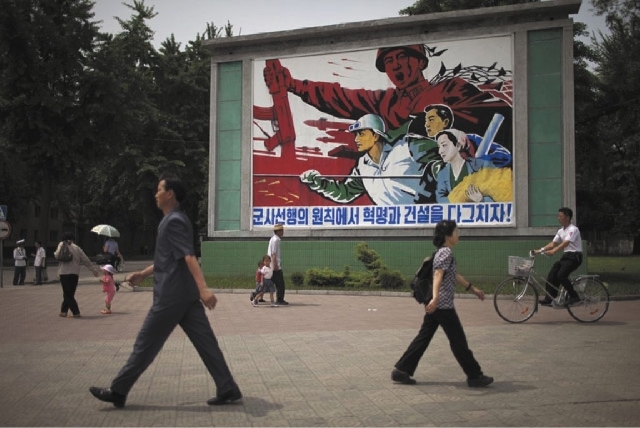North Korea proposes high-level talks with US

PYONGYANG, North Korea — North Korea’s top governing body on Sunday proposed high-level nuclear and security talks with the United States in an appeal sent just days after calling off talks with rival South Korea.
The powerful National Defense Commission headed by North Korean leader Kim Jong Un issued a statement through state media proposing “senior-level” talks to ease tensions and discuss a peace treaty formally ending the Korean War.
The rare proposal for talks between the Korean War foes follows months of acrimony over North Korea’s defiant launch of a long-range rocket in December and a nuclear test in February, provocative acts that drew tightened U.N. and U.S. sanctions. The U.S. and South Korea countered the moves by stepping up annual springtime military exercises that prompted North Korea to warn of a “nuclear war” on the Korean Peninsula.
However, as tensions subsided in May and June, Pyongyang has made tentative overtures to re-establish dialogue with South Korea and Washington. Foreign analysts say impoverished North Korea often expresses interest in talks after raising tensions with provocative behavior in order to win outside concessions.
In a notable shift in propaganda in Pyongyang, posters and billboards calling on North Koreans to “wipe away the American imperialist aggressors” have been taken down in recent weeks.
There was no immediate response from Washington, but President Barack Obama’s envoy on North Korea said Friday that while the U.S. is not averse to talking with Pyongyang, the bar for resuming engagement is higher in the wake of repeated threats and provocations.
Meanwhile, a recent proposal from Pyongyang for Cabinet-level talks with South Korea – the first in six years – led to plans for two days of meetings in Seoul earlier this week. The talks fell apart on Tuesday over who would lead the two delegations.
North Korea fought against U.S.-led United Nations and South Korean troops during the three-year Korean War in the early 1950s, and Pyongyang does not have diplomatic relations with either government. The Korean Peninsula remains divided by a heavily fortified border.
Reunifying the Korean Peninsula was a major goal of North Korea’s two late leaders, Kim Il Sung and Kim Jong Il, and is a legacy inherited by current leader Kim Jong Un. North Korea is expected to draw attention to Korea’s division in the weeks leading up to the 60th anniversary in July marking the close of the Korean conflict, which ended in an armistice. A peace treaty has never been signed formally ending the war.
Washington’s top worry is North Korea’s nuclear weapons program. Pyongyang is estimated to have a handful of crude nuclear devices and has been working toward building a bomb it can mount on a missile capable of striking the United States.
Earlier this year, Kim Jong Un enshrined the drive to build a nuclear arsenal, as well as building the economy, as national goals. North Korea claims the need to build atomic weapons to defend the country against what it sees as a U.S. nuclear threat in Korea and the region.
North Korea will not give up its nuclear ambitions until the entire Korean Peninsula is free of nuclear weapons, a spokesman from the National Defense Commission said in a statement carried by the Korean Central News Agency.
“The denuclearization of the Korean Peninsula does not only mean `dismantling the nuclear weapons of the North,’ the spokesman said, but also should involve “denuclearizing the whole peninsula, including South Korea, and aims at totally ending the U.S. nuclear threats” to North Korea.
After blaming Washington for raising tensions, he called on the U.S. to set the venue and date for talks.
U.S. envoy Glyn Davies said Friday in Washington that the U.S. would not accept North Korea as a nuclear state nor reward it for “absence of bad behavior.”
The key to a diplomatic solution, he said, is for the U.S. and North Korea’s four neighbors involved in long-stalled nuclear negotiations with Pyongyang to send a unified message: that it must live up to previous commitments to denuclearize. Davies, who is to meet with his Japanese and South Korean counterparts next week to discuss North Korea, said there is a growing international consensus against the North’s nuclear ambitions.
“We have every expectation that Beijing will use its special relationship with the DPRK to encourage Pyongyang to choose a different path,” he said, referring to the North’s formal name, the Democratic People’s Republic of Korea in a comments made at the Wilson Center think tank.
Washington has been burned in the past by efforts to reach out to Pyongyang. Last year, months of behind-the-scenes negotiations yielded a significant food-for-disarmament deal in February 2012 – but that was scuttled by a failed North Korean long-range rocket launch just weeks later.
Pyongyang’s bid to reach out to the U.S. comes as South Korea’s new president, Park Geun-hye, is to sit down for talks with China’s new leader, Xi Jinping, later this month.
“The fact that North Korea proposed talks (with the U.S.) ahead of the South Korea-China summit signifies its intent to keep China in check,” said Kim Yong-hyun, a professor of North Korean studies of Dongguk University in Seoul, South Korea.
Pyongyang also is sending a message to South Korea warning that if Seoul does not actively try to improve relations with North Korea, the regime will go directly to Washington, sidelining Seoul, he said.
—
Associated Press writers Youkyung Lee and Foster Klug in Seoul, South Korea, and Matthew Pennington in Washington, contributed to this report. Follow AP’s Korea bureau chief at http://www.twitter.com/newsjean .